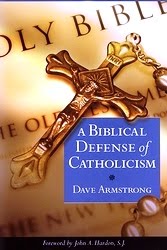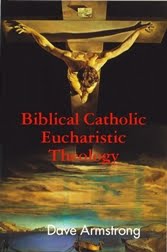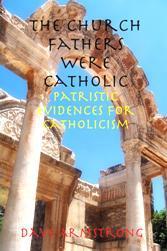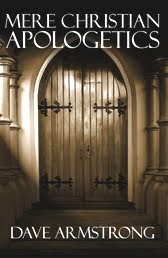Luther and Calvin vs. the Church Fathers
[originally uploaded 17 February 2001. Revised and expanded on 13 August 2003]
* * * * *
Jesus did not literally become sin, or a sinner. He was sacrificed for our sins (Is 53:10) and bore the penalties for our sins and transgressions (Is 53:4-6). But He Himself was without sin, being God, in Whom no sin can dwell. It is not possible for God (even the incarnate God) to "be a sinner," and it is heresy and blasphemy to make such an outrageous claim. The Fathers explain what was meant at 2 Corinthians 5:21, which is the usual Protestant primary source for the assertion that Jesus "became sin" in a crass literal sense:
*** CLICK ON "Tolle, lege!" immediately below to finish this article ***
For our sake he made him to be sin who knew no sin, so that in him we might become the righteousness of God. (RSV)Ancient Christian Commentary (general editor Thomas C. Oden, Downers Grove, IL: InterVarsity Press, 1998 - ):
Ambrosiaster:
In view of the fact that he was made an offering for sins, it is not wrong for him to be said to have been made 'sin,' because in the law the sacrifice which was offered for sins used to be called a 'sin.'St. John Chrysostom:
[Commentary on Paul's Epistles]
God allowed his Son to suffer as if a condemned sinner, so that we might be delivered from the penalty of our sins.St. Cyril of Alexandria:
[Homilies on the Epistles of Corinthians]
We do not say that Christ became a sinner, far from it, but being righteous (or rather, righteousness, because he did not know sin at all), the Father made him a victim for the sins of the world.St. Ambrose:
[Letter 41.10]
So, was the Lord turned into sin? Not so, but, since he assumed our sins, he is called sin. For the Lord is also called an accursed thing [Gal 3:13], not because the Lord was turned into an accursed thing but because he himself took on our curse . . . It is written that he was made sin, that is, not by the nature and operation of sin . . .; but that he might crucify our sin in his flesh, he assumed for us the burden of the infirmities of a body already guilty of carnal sin.Eusebius:
[The Sacrament of the Incarnation of Our Lord 6.60]
He embraced death for us with all willingness and 'became a curse for us,' holy and all-blessed though he was.St. Gregory Nazianzen:
[The Proof of the Gospel 4.17]
. . . it is said that he was made sin or a curse for us; not that the Lord was transformed into either of these - how could he be? But because by taking them upon him he took away our sins and bore our iniquities.Additional commentary:
[Letters on the Apollinarian Controversy 101]
St. Augustine:
He Himself could commit no sin. But because of the likeness of the flesh of sin in which He came, He was Himself called sin, who was to be sacrificed for a washing away of sin . . . that is, a sacrifice for sin, by means of which we are able to be reconciled . . . the sin He became was not His own but ours.It doesn't follow that because sin was merely "imputed" (not infused) to Jesus in some fashion on the Cross, that therefore righteousness is merely imputed to us, rather than infused, because the Bible teaches that our righteousness can be actual, by God's grace, not just called righteous when in fact we aren't righteous at all. Jesus could not have sinned, being God. But we can be righteous and evil alike. He bore the penalties and ravages of sin on our behalf in order to save us. But we can be truly righteous, in God's grace. Therefore, the analogy, used in support of sola fide, fails. This is an alien philosophy imported into scriptural thinking, not the teaching of Scripture itself, which often contradicts it.
[Enchiridion of Faith, Hope, and Love 13.41]
In other words, at the Cross God the Father is not in effect saying about Jesus: "He is a sinner and perfectly holy at the same time." Rather, the entire intent of this passage is that Jesus bore our sins and its penalties. This was merely a pungent Hebraic way of saying that He bore sin, that He "became sin." The meaning is entirely different. But Luther and Protestants want to claim that God will call us righteous even if we are not, literally speaking. That is both illogical and an unbiblical notion. Our righteousness is entirely due to Christ and His grace, true, but it is actual and real, not merely some fiction or imaginary vision in God's mind. What He declares, He brings to pass, literally, concretely. Of course, in Catholic spirituality, such sanctification is a lifelong process. We are a work in progress. Imputed righteousness led Luther to say such absurd, ridiculous things as the following:
One and the same act may be accepted before God and not accepted, be good and not good.Given these sentiments, it should not surprise us that Luther frequently contradicts himself, as well as Holy Scripture and Sacred Tradition. He even blasphemes Jesus by claiming that our Lord offered to be consigned to hell for us (as if it is possible for God the Son to be eternally separated from God the Father - this is impossible to even consider as any sort of potentiality at all):
The gospel is a teaching having no connection whatever with reason, whereas the teaching of the law can be understood by reason . . . reason cannot grasp an extraneous righteousness.
[in Hartmann Grisar, Luther, vol. 1 of 6 (translated by E.M. Lamond, edited by Luigi Capadelta, London: Kegan Paul, Trench, Trubner & Co., 2nd edition, 1914, 216-217; from Commentary on Romans]
He found Himself in a state of condemnation and abandonment . . . He actually and in truth offered Himself to the eternal Father to be consigned to eternal damnation for us. His human nature did not behave differently from that of a man who is to be condemned eternally to hell. On account of this love of God, God at once raised Him from death and hell, and so He overcame hell.This is heresy. Jesus (being God incarnate) cannot cease to be holy at any time, nor can he be a "sinner" - not even on the cross. But Luther goes on and on in this line of thinking:
[Grisar, ibid., vol. 1, 239-240; from Commentary on Romans (1515-1516); edition of J. Ficker, Leipzig: 1908, 218 ff.)
But Christ took upon Himself all of our sin, and thus He died upon the cross. Therefore he had to become that which we are, namely a sinner, a murderer, evildoer, etc. . . . For insofar as he is a victim for the sins of the whole world, He is not now such a person as is innocent and without sin, is not God's Son in all glory, but a sinner, abandoned by God for a short time; Psalms 8:6.
[Detailed Explanation of the Epistle to the Galatians, part 2, fourth argument, Walch edition, vol. 8, p. 2165, nos. 321-324; cf. Commentary on Galatians, translatd by Erasmus Middleton, ed. J.P. Fallowes, London: 1850; reprinted by Kregel Publications, Grand Rapids, MI, 1979, 164-165]
The popish sophisters do spoil us of this knowledge of Christ . . . when they separate Him from sins and sinners . . . But we must wrap Christ, and know Him to be wrapped in our sins, in our malediction, in our death, and in all our evils, as He is wrapped in our flesh and blood . . . if it be not absurd to confess and believe that Christ was crucified between two thieves, then it is not absurd to say also that He was accursed, and of all sinners the greatest [he then cites 2 Cor 5:21].Philip Melanchthon, in his letter to Johann Brenz (May 1531), illustrates how the Protestants had departed from patristic precedent:
[Commentary on Galatians, translated by Erasmus Middleton, 165; on Gal 3:13]
Christ . . . did put upon Himself our person, and laid our sins upon His own shoulders, saying, I have committed the sins which all men have committed . . .
[Ibid., 171]
We must not then imagine Christ to be innocent, and as a private person who is holy and righteous for Himself alone, as do the schoolmen, and as nearly all of the fathers have done. True it is that Christ is a person most pure and unspotted; but thou must not stay there: for thou hast not yet Christ, although thou know Him to be God and man . . .
. . . He putting off His innocency and holiness . . .
[cites 2 Cor 5:21] And although these sentences may be well expounded after this manner: Christ is made a curse, that is to say, a sacrifice for the curse; and sin, that is, a sacrifice for sin: yet, in my judgment, it is better to keep the proper signification of the words, because there is a greater force and vehemency in them. For when a sinner cometh to the knowledge of himself indeed, he feeleth not only that he is miserable, but misery itself: not only that he is a sinner, and accursed, but even sin and malediction itself. For it is a terrible thing to bear sin, the wrath of God, malediction and death. Wherefore that man who hath a true feeling of these things (as Christ did truly and effectually feel them for all mankind) is made even sin, death, malediction, etc. . . . guilty of all our malediction, our sins, and all our evils . . .
[Ibid., 174-175]
Avert your eyes from such a regeneration of man and from the Law and look only to the promises and to Christ . . . Augustine is not in agreement with the doctrine of Paul, though he comes nearer to it than do the Schoolmen. I quote Augustine as in entire agreement, although he does not sufficiently explain the righteousness of faith; this I do because of public opinion concerning him.Romans 8:3 provides a similar passage, with regard to Jesus supposedly becoming a "sinner" on the cross:
[Grisar, ibid., vol. 4, 459-460]
For God has done what the law, weakened by the flesh, could not do: sending his own Son in the likeness of sinful flesh and for sin, he condemned sin in the flesh. (RSV, as throughout)What did the Fathers think of this passage?:
Ancient Christian Commentary:
Ambrosiaster:
By sending Christ God used sin to condemn sin . . . For Christ was crucified by sin, which is Satan; hence sin sinned in the flesh of the Savior's body. In this way, God condemned sin in the flesh, in the very place where it sinned.St. John Chrysostom:
[Commentary on Paul's Epistles]
For Christ did not have sinful flesh but flesh which, though it was like ours by nature, was sinless. From this it is plain that flesh is not sinful by nature . . . he allowed the flesh to keep its own nature, giving it the crown of victory and after its resurrection life immortal.St. Augustine:
[Homilies on Romans 13]
The apostle calls the assumption of mortal flesh 'sin' even if it was sinless, because when the Savior died he was made sin, so to speak.
[On Romans 48]
What does sinful flesh have? Death and sin. What does the likeness of sinful flesh have? Death without sin.And Galatians 3:13:
[Sermons for Easter Season, Homily 233.3]
Christ redeemed us from the curse of the law, having become a curse for us - for it is written, 'Cursed be every one who hangs on a tree'.Ancient Christian Commentary:
Ambrosiaster:
Jesus was made a curse in the way that under the law a victim offered for sin is said to be sin . . . Thus he did not say 'cursed for us' but 'made a curse.'St. John Chrysostom:
[Epistle to the Galatians 3.13.1-2]
Just as, when someone is condemned to death, another innocent person who chooses to die for him releases him from that punishment, so Christ also did.The Jesuit theologian Fernand Prat sums up the Catholic interpretation, in a comment on 2 Corinthians 5:21:
[Homily on Galatians 3.13]
Here again there is, properly speaking, no substitution of persons, but solidarity of action. Sin is not transferred from men to Christ, but it proceeds from men to embrace Christ as the representative of human nature, just as the justice of God is nor transferred from Christ to men, but proceeds from Christ tro embrace men, when the latter, by filial adoption, are clothed with the divine nature. This idea is more clearly expressed in the second sentence, for we become the justice of God only in Christ; that is to say, only in so far as we are united with him; but the two parts of the phrase are parallel and are intended mutually to explain each other . . .The views of Luther and Calvin, however, depart from the biblical understanding, as interpreted by the Fathers and Catholic Tradition:
Jesus is neither a sinner nor sin, personally, but as a member of a sinful family, with which he identifies himself. It is in the same sense that he is made a 'curse,' like the branch of an accursed tree. Similarly, on account of our union with him who is justice itself, we participate in his 'justice.' Jesus, being by his nature impeccable, cannot be made a sinner by his contact with sinners, while our moral union with the Just One par excellence renders us really just ourselves. And this justice, because it comes from grace and not from us, is rightly called the 'justice of God.'
[The Theology of St. Paul, Westminster, MD: Newman Bookshop, 1952, orig. 1927, vol. II, 204-205]
Although death remained in that flesh on our account, the leaven of sin was nevertheless purged out, and it became the purest flesh, purified by the Holy Spirit and united with the divine nature in one Person. Therefore it is truly human nature no different from what it is in us . . . The Holy Spirit wanted Him to sink into sin as deeply as possible. Consequently, He had to be besmirched with incest and born from incestuous blood.This is (or at least appears to be, prima facie) grossly heretical, as God does not have to be "purged" or "purified" of sin at all. Paul Althaus, in his standard work, The Theology of Martin Luther (translated by Robert C. Schultz, Philadelphia: Fortress Press, 1966, 197-198), notes Luther's contradictory views on the Two Natures of Christ:
(Luther, Commentary on Genesis, 1544, footnote 81: Luther's Works 7:13)
. . . God is at once completely above and completely below. He is the creator and the Lord and yet at the same time the lowest creature and a servant subject to all men, yes, even to the devil. This man Jesus who bears the wrath of God, the sin of the world, all earthly trouble, yes, hell itself, is at the same time the highest God. The mystery of Christ cannot be expressed without these paradoxes. This is especially true of Christ's sufferings on the cross . . . Luther had to come to terms with Christ's assertion on the cross that he was forsaken by God. In a sermon in 1537, he understands it in this way: The deity has certainly not departed from the humanity (deity and humanity are inseparably united in Christ); but 'the deity withdrew and hid . . . the humanity was left alone, the devil had free access to Christ, and the deity withdrew its power and let the humanity fight alone.' Elsewhere Luther says that Christ on the cross did not feel his deity but suffered purely as a man. The second statement can be reconciled with Luther's thought that the deity suffered in Christ but the former cannot, at least not in the form that the deity 'withdrew.' This does not do justice to the mystery of the suffering of the deity in the sufferings of the man Jesus Christ; that can be expressed only in paradoxical terms. The deity of Christ specifically did not withdraw while the man Jesus was suffering but is present in him both in his suffering and victory . . . his dogmatic theory which describes Christ as true God and true man is not unified within itself but displays contradictions. Theology had to go beyond it.Althaus also comments upon how Luther's notion of Jesus suffering the wrath of hell differed from that of the Fathers:
Christ does not stop loving God above all things even though he fully experiences being forsaken by God, being under God's wrath, and the hell of being far from God . . . Certainly he feels as the damned feel. He trembles before God and would like to flee from him; but at the same time is able to love him . . .Along these lines, John Calvin writes, in his Institutes:
Christ suffers hell and the wrath of God and overcomes them with the power of his love of God. This is how Luther understands the Article of Christ's descent into hell. It is part of Christ's death agony. Through it Christ gains the victory over hell . . . Luther also teaches a descent of Christ into hell after his death. This two-sidedness brings him into difficulty. In spite of this, there is no doubt that luther's own personal understanding of Christ's descent into hell relates it to the passion, Gethsemane, and Golgotha. Calvin adopted this understanding and it was accepted in some confessions of faith of the Reformed Church. In distinction from Luther, Melanchthon understood the descent into hell as Christ's triumphal victory march into hell. Christ terrifies the devils and the damned by showing them his power. Lutheran orthodoxy developed this idea. The descent into hell is the first stage of Christ's exaltation. Thus Luther's deep understanding is abandoned. Lutherans, for the most part, opposed the Reformed understanding of the descent into hell as part of the humiliation without realizing that they were also polemicizing against Luther.
Luther's doctrine of the cross transcends all earlier theology through the radical seriousness with which he allows Christ to suffer both hell and being totally forsaken by God . . . He who wills to be our Savior must also have suffered our own hell. This hell is not a future condition or place but a present reality which a terrified conscience experiences under the wrath of God. Christ who has experienced both hell and being forsaken by God is directly involved in the distress of all men under the wrath of God and their distress is directly involved in his passion.
(Ibid., 206-208)
But we must seek a surer explanation, apart from the Creed, of Christ's descent into hell. The explanation given to us in God's Word is not only holy and pious, but also full of wonderful consolation. If Christ had died only a bodily death, it would have been ineffectual. No -- it was expedient at the same time for him to undergo the severity of God's vengeance, to appease his wrath and satisfy his just judgment. For this reason he must grapple hand in hand with the armies of hell and the dread of everlasting death . . . No wonder, then, if he is said to have descended into hell, for he suffered the death that God in his wrath had inflicted upon the wicked! . . . he paid a greater and more excellent price in suffering in his soul the terrible torments of a condemned and forsaken man.The editors (vol. 1, 514, footnote 19) note how this differed from traditional Catholic teaching, as exemplified in the view of St. Thomas Aquinas: "Summa Theol. III. lii. 5: "When Christ descended into hell, by the power of his Passion he delivered the saints from this penalty whereby they were excluded from the life of glory . . . " In footnote 23 on page 515, they state:
(Institutes of the Christian Religion, II, XVI, 10, vol. I, 515-516, in the edition edited by John T. McNeill and translated and indexed by Ford Lewis Battles, Philadelphia: Westminster Press, 1960)
Here certain untutored wretches, impelled more by malice than by ignorance, cry out that I am doing a frightful injustice to Christ. For they hold it incongruous for him to fear for the salvation of his soul . . .
Our opponents, refuted, jump to another misrepresentation: although Christ feared death, he did not fear God's curse and wrath, from which he knew himself to be safe.
(Ibid., II, XVI, 12, vol. 1, 517, 519)
. . . The prevailing interpretation of this article of the Creed was that of Aquinas." They cited precedents for Calvin's view in Nicolas of Cusa and Pico della Mirandola, and state that "Luther adopted the view that Christ, as God and man, literally entered into hell. The Catechism of the Council of Trent, sec. 49, following Aquinas, states that Christ liberated the (Old Testament) fathers and other pious men from imprisonment in limbo.













.jpg)






























.gif)

.jpg)









0 comments:
Post a Comment